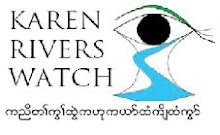ထုိင္း၀န္ႀကီးခ်ဳပ္ေဟာင္းသက္ဆင္ ထား၀ယ္စီမံကိန္းသို႔လာေရာက္
ထုိင္း၀န္ႀကီးခ်ဳပ္ေဟာင္းသက္ဆင္ ထား၀ယ္စီမံကိန္းသို႔လာေရာက္ – Thai ex PM visited Burma
Yangon Press International
Yangon Press International
မတ္လ ၁၇၊ ၂၀၁၂
ထုိင္း၀န္ႀကီးခ်ဳပ္ေဟာင္း သက္ဆင္ မတ္လ ၁၃ ရက္ေန႔ နံနက္ပိုင္းက ထား၀ယ္ ေရနက္ဆိပ္ကမ္းႏွင့္ အထူး စီးပြားေရးဇုန္စီမံကိန္းသို႔ သြားေရာက္ၾကည့္ရႈၿပီး အီတာလွ်ံထုိင္း ကုမၸဏီသေဘၤာေပၚတြင္ တစ္ည အိပ္ခဲ့ေၾကာင္း စီမံကိန္း၀န္ထမ္းတဦးက ေျပာသည္။
ထား၀ယ္သုိ႔ ကိုယ္ပိုင္ သီးသန္႔ေလယာဥ္ျဖင့္ လာေရာက္သည့္ သက္ဆင္သည္ မတ္လ ၁၄ ရက္ ေန႔ မနက္ပိုင္းတြင္ ထား၀ယ္မွ ျပန္လည္ ထြက္ခြာသြားေၾကာင္းလည္း ၎၀န္ထမ္းက ျဖည့္စြက္ေျပာဆိုသည္။
“သက္ဆင္လာတယ္။ သေဘၤာေပၚတစ္ညအိပ္ၿပီး ျပန္သြားတယ္။ ဒီတစ္ခါက ဒုတိယအေခါက္ေပါ့။ သူနဲ႔ အတူ ေနာက္ထပ္ လူႀကီးႏွစ္ေယာက္ပါေသးတယ္။ ဘယ္သူလဲေတာ့ မသိဘူး “ ဟု မ်က္ျမင္ေတြ႕လိုက္ရသည့္ စီမံကိန္း ၀န္ထမ္း ကေျပာသည္။
ယခုခရီးစဥ္သည္ ထိုင္း၀န္ႀကီးခ်ဳပ္ေဟာင္းသက္ဆင္၏ ထား၀ယ္ေရနက္ဆိပ္ကမ္းသို႔ ဒုတိယေျမာက္ခရီးစဥ္ျဖစ္ၿပီး ယမန္ႏွစ္ ဒီဇင္ဘာလ အတြင္းကလည္း တစ္ႀကိမ္လာေရာက္ခဲ့ဖူးသည္။
၁၃ ရက္ေန႔မနက္ပိုင္းက ေရာက္ရွိလာေသာ ထုိင္း၀န္ႀကီးခ်ဳပ္ေဟာင္း စီးနင္းလာသည့္ ကိုယ္ပိုင္သီးသန္႔ ေလယဥ္မွာ ထား၀ယ္ ေလဆိပ္တြင္ ညအိပ္ရပ္နားကာ မတ္လ ၁၄ ရက္ေန႔ မနက္ပိုင္းတြင္ ထား၀ယ္ေလဆိပ္မွ ကေမၻာဒီးယားသို႔ ထြက္ခြာသြားသည္ဟု ထား၀ယ္ေလဆိပ္မွ ၀န္ထမ္းတစ္ဦးကလည္း သက္ဆင္၏ ခရီးစဥ္ကို အတည္ျပဳေျပာၾကားသည္။
“ သူလာေတာ့ က်ေနာ္တို႔ဘက္က လံုၿခံဳေရးတာ၀န္ယူေပးရတာေပါ့။ မေကာင္းပါဘူးဗ်ာ။ သူမ်ားႏိုင္ငံက ၀ရမ္းေျပးကို သြားေစာင့္ေပး ေနရတာ “ ဟု ယခင္တစ္ေခါက္ခရီးစဥ္ႏွင့္ ပက္သက္၍ အစိုးရလံုၿခံဳေရးဆိုင္ရာ အရာရွိတစ္ဦးက ဆိုသည္။
ထိုင္း၀န္ႀကီးခ်ဳပ္ေဟာင္း၏ စကားျပန္မွာ စီမံကိန္းဧရိယာသို႔ လိုက္ပါမသြားဘဲ ထား၀ယ္တြင္ပင္ က်န္ခဲ့ကာ ေလယဥ္ေမာင္း ႏွစ္ဦးႏွင့္ ေလယဥ္မယ္တို႔မွာလည္း ထား၀ယ္ Golden Guest ဟိုတယ္တြင္ တည္းခိုသြားေၾကာင္း ထား၀ယ္ၿမိဳ႕မွ စီးပြားေရးသမားတစ္ဦး ကေျပာၾကားသည္။
“ သူ႔အေနနဲ႔ ဒီထား၀ယ္ေရနက္ဆိပ္ကမ္းမွာ ဘယ္လို အခန္းက႑ကေန ပါ၀င္ပက္သက္ေနတယ္ဆိုတာ သတိထားဖို႔ လိုအပ္တယ္။ အခု လာတာကလည္း ခိုးေၾကာင္ခိုး၀ွက္နဲ႔ လူမသိသူမသိ လာတာေလ။ သူ႕လိုလူတစ္ေယာက္က လူသိရွင္ၾကား လာရမွာေပါ့ “ ဟု သက္ဆင္၏ ခရီးစဥ္ႏွင့္ ပက္သက္၍ ထား၀ယ္စီမံကိန္းအေၾကာင္း စိတ္၀င္စားသူေဒသခံတစ္ဦးက ဆိုသည္။
ထိုင္းဆက္သြယ္ေရးကုမၸဏီ Advanced Info Service ကိုတည္ေထာင္ၿပီး သန္းႀကြယ္သူေဌးျဖစ္လာသူ သက္ဆင္မွာ ၂၀၀၁မွစ၍ ထိုင္း၀န္ႀကီးခ်ဳပ္ တာ၀န္ထမ္းေဆာင္ခဲ့ၿပီး ဒုတိယသက္တမ္းအတြင္း ၂၀၀၆ ခုႏွစ္တြင္ ႏိုင္ငံျခားသို႔ေရာက္ရွိေနစဥ္ စစ္တပ္မွ အာဏာသိမ္း ျခင္းခံရသည္။
ေငြေၾကးအလြဲသံုးစားမႈမ်ားျဖင့္ ၂၀၀၈ ခုႏွစ္ အတြင္းက မ်က္ကြယ္ေထာင္ဒဏ္ (၂) ႏွစ္ခ်မွတ္ခံရျခင္းသူ သက္ဆင္၏ သမာရိုးက် မဟုတ္ေသာ ပိုင္ဆိုင္မႈျဖစ္ေသာ ဘတ္ေငြ ၄၆ ဘီလ်ံအား တရားရံုးအမိန္႔ျဖင့္ ၂၀၁၀ခုႏွစ္တြင္ သိမ္းဆည္းခဲ့သည္။
အေျခခံ အေဆာက္အအံုစီမံကိန္းမ်ား အႀကီးအက်ယ္အေကာင္အထည္ေဖာ္ခဲ့ေသာ ထိုင္း၀န္ႀကီးခ်ဳပ္သက္ဆင္ လက္ထက္က ဘန္ေကာက္ၿမိဳ႕ သု၀ဏၰဘူမိႏိုင္ငံတကာေလဆိပ္စီမံကိန္းတြင္ ယခုထား၀ယ္စီမံကိန္း အေကာင္အထည္ေဖာ္သည့္ အီတာလ်ံထိုင္းကုမၸဏီ က အဓိက အခန္းက႑မွ ပါ၀င္ခဲ့သည္။ ။
ထိုင္းအေျခစိုက္ အင္အားႀကီး ေဆာက္လုပ္ေရးကုမၸဏီ အီတာလွ်ံထိုင္းမွ တည္ေဆာာက္ အေကာင္အထည္ေဖာ္ေနေသာ (၅၈) ဘီလ်ံ ခန္႔ ရင္းႏွီးျမဳပ္ႏွံမႈမည့္ ထား၀ယ္ေရနက္ဆိပ္ကမ္း စီမံကိန္းတြင္ ျမန္မာစီးပြားေရးလုပ္ငန္းရွင္ ဦးေဇာ္ေဇာ္ပိုင္ MAX Myanmay ကုမၸဏီက လည္း ရွယ္ယာ (၂၅) ရာခုိင္ႏႈန္း ပိုင္ဆိုင္ထားသည္။
အေရွ႕ေတာင္အာရွတြင္ အႀကီးဆံုး ေရနက္ဆိပ္ကမ္းႏွင့္ အထူးစီးပြားေရးဇုန္ စီမံကိန္း ျဖစ္လာမည္ျဖစ္သည့္ ထား၀ယ္ စီမံကိန္းသည္ ထိုင္းႏိုင္ငံအား ေဒသတြင္း ကုန္သြယ္ေရးဗဟိုျဖစ္ေစရန္ဟု အီတာလ်ံ ထိုင္းကုမၸဏီထုတ္ စိတ္ကူးပံုရိပ္ အစီအစဥ္ (Conceptual Plan) တြင္ ေဖာ္ျပထားသည္။ ။
မူရင္း – Yangon Press International – http://www.facebook.com/ygnpress
ထုိင္း၀န္ႀကီးခ်ဳပ္ေဟာင္း သက္ဆင္ မတ္လ ၁၃ ရက္ေန႔ နံနက္ပိုင္းက ထား၀ယ္ ေရနက္ဆိပ္ကမ္းႏွင့္ အထူး စီးပြားေရးဇုန္စီမံကိန္းသို႔ သြားေရာက္ၾကည့္ရႈၿပီး အီတာလွ်ံထုိင္း ကုမၸဏီသေဘၤာေပၚတြင္ တစ္ည အိပ္ခဲ့ေၾကာင္း စီမံကိန္း၀န္ထမ္းတဦးက ေျပာသည္။
ထား၀ယ္သုိ႔ ကိုယ္ပိုင္ သီးသန္႔ေလယာဥ္ျဖင့္ လာေရာက္သည့္ သက္ဆင္သည္ မတ္လ ၁၄ ရက္ ေန႔ မနက္ပိုင္းတြင္ ထား၀ယ္မွ ျပန္လည္ ထြက္ခြာသြားေၾကာင္းလည္း ၎၀န္ထမ္းက ျဖည့္စြက္ေျပာဆိုသည္။
“သက္ဆင္လာတယ္။ သေဘၤာေပၚတစ္ညအိပ္ၿပီး ျပန္သြားတယ္။ ဒီတစ္ခါက ဒုတိယအေခါက္ေပါ့။ သူနဲ႔ အတူ ေနာက္ထပ္ လူႀကီးႏွစ္ေယာက္ပါေသးတယ္။ ဘယ္သူလဲေတာ့ မသိဘူး “ ဟု မ်က္ျမင္ေတြ႕လိုက္ရသည့္ စီမံကိန္း ၀န္ထမ္း ကေျပာသည္။
ယခုခရီးစဥ္သည္ ထိုင္း၀န္ႀကီးခ်ဳပ္ေဟာင္းသက္ဆင္၏ ထား၀ယ္ေရနက္ဆိပ္ကမ္းသို႔ ဒုတိယေျမာက္ခရီးစဥ္ျဖစ္ၿပီး ယမန္ႏွစ္ ဒီဇင္ဘာလ အတြင္းကလည္း တစ္ႀကိမ္လာေရာက္ခဲ့ဖူးသည္။
၁၃ ရက္ေန႔မနက္ပိုင္းက ေရာက္ရွိလာေသာ ထုိင္း၀န္ႀကီးခ်ဳပ္ေဟာင္း စီးနင္းလာသည့္ ကိုယ္ပိုင္သီးသန္႔ ေလယဥ္မွာ ထား၀ယ္ ေလဆိပ္တြင္ ညအိပ္ရပ္နားကာ မတ္လ ၁၄ ရက္ေန႔ မနက္ပိုင္းတြင္ ထား၀ယ္ေလဆိပ္မွ ကေမၻာဒီးယားသို႔ ထြက္ခြာသြားသည္ဟု ထား၀ယ္ေလဆိပ္မွ ၀န္ထမ္းတစ္ဦးကလည္း သက္ဆင္၏ ခရီးစဥ္ကို အတည္ျပဳေျပာၾကားသည္။
“ သူလာေတာ့ က်ေနာ္တို႔ဘက္က လံုၿခံဳေရးတာ၀န္ယူေပးရတာေပါ့။ မေကာင္းပါဘူးဗ်ာ။ သူမ်ားႏိုင္ငံက ၀ရမ္းေျပးကို သြားေစာင့္ေပး ေနရတာ “ ဟု ယခင္တစ္ေခါက္ခရီးစဥ္ႏွင့္ ပက္သက္၍ အစိုးရလံုၿခံဳေရးဆိုင္ရာ အရာရွိတစ္ဦးက ဆိုသည္။
ထိုင္း၀န္ႀကီးခ်ဳပ္ေဟာင္း၏ စကားျပန္မွာ စီမံကိန္းဧရိယာသို႔ လိုက္ပါမသြားဘဲ ထား၀ယ္တြင္ပင္ က်န္ခဲ့ကာ ေလယဥ္ေမာင္း ႏွစ္ဦးႏွင့္ ေလယဥ္မယ္တို႔မွာလည္း ထား၀ယ္ Golden Guest ဟိုတယ္တြင္ တည္းခိုသြားေၾကာင္း ထား၀ယ္ၿမိဳ႕မွ စီးပြားေရးသမားတစ္ဦး ကေျပာၾကားသည္။
“ သူ႔အေနနဲ႔ ဒီထား၀ယ္ေရနက္ဆိပ္ကမ္းမွာ ဘယ္လို အခန္းက႑ကေန ပါ၀င္ပက္သက္ေနတယ္ဆိုတာ သတိထားဖို႔ လိုအပ္တယ္။ အခု လာတာကလည္း ခိုးေၾကာင္ခိုး၀ွက္နဲ႔ လူမသိသူမသိ လာတာေလ။ သူ႕လိုလူတစ္ေယာက္က လူသိရွင္ၾကား လာရမွာေပါ့ “ ဟု သက္ဆင္၏ ခရီးစဥ္ႏွင့္ ပက္သက္၍ ထား၀ယ္စီမံကိန္းအေၾကာင္း စိတ္၀င္စားသူေဒသခံတစ္ဦးက ဆိုသည္။
ထိုင္းဆက္သြယ္ေရးကုမၸဏီ Advanced Info Service ကိုတည္ေထာင္ၿပီး သန္းႀကြယ္သူေဌးျဖစ္လာသူ သက္ဆင္မွာ ၂၀၀၁မွစ၍ ထိုင္း၀န္ႀကီးခ်ဳပ္ တာ၀န္ထမ္းေဆာင္ခဲ့ၿပီး ဒုတိယသက္တမ္းအတြင္း ၂၀၀၆ ခုႏွစ္တြင္ ႏိုင္ငံျခားသို႔ေရာက္ရွိေနစဥ္ စစ္တပ္မွ အာဏာသိမ္း ျခင္းခံရသည္။
ေငြေၾကးအလြဲသံုးစားမႈမ်ားျဖင့္ ၂၀၀၈ ခုႏွစ္ အတြင္းက မ်က္ကြယ္ေထာင္ဒဏ္ (၂) ႏွစ္ခ်မွတ္ခံရျခင္းသူ သက္ဆင္၏ သမာရိုးက် မဟုတ္ေသာ ပိုင္ဆိုင္မႈျဖစ္ေသာ ဘတ္ေငြ ၄၆ ဘီလ်ံအား တရားရံုးအမိန္႔ျဖင့္ ၂၀၁၀ခုႏွစ္တြင္ သိမ္းဆည္းခဲ့သည္။
အေျခခံ အေဆာက္အအံုစီမံကိန္းမ်ား အႀကီးအက်ယ္အေကာင္အထည္ေဖာ္ခဲ့ေသာ ထိုင္း၀န္ႀကီးခ်ဳပ္သက္ဆင္ လက္ထက္က ဘန္ေကာက္ၿမိဳ႕ သု၀ဏၰဘူမိႏိုင္ငံတကာေလဆိပ္စီမံကိန္းတြင္ ယခုထား၀ယ္စီမံကိန္း အေကာင္အထည္ေဖာ္သည့္ အီတာလ်ံထိုင္းကုမၸဏီ က အဓိက အခန္းက႑မွ ပါ၀င္ခဲ့သည္။ ။
ထိုင္းအေျခစိုက္ အင္အားႀကီး ေဆာက္လုပ္ေရးကုမၸဏီ အီတာလွ်ံထိုင္းမွ တည္ေဆာာက္ အေကာင္အထည္ေဖာ္ေနေသာ (၅၈) ဘီလ်ံ ခန္႔ ရင္းႏွီးျမဳပ္ႏွံမႈမည့္ ထား၀ယ္ေရနက္ဆိပ္ကမ္း စီမံကိန္းတြင္ ျမန္မာစီးပြားေရးလုပ္ငန္းရွင္ ဦးေဇာ္ေဇာ္ပိုင္ MAX Myanmay ကုမၸဏီက လည္း ရွယ္ယာ (၂၅) ရာခုိင္ႏႈန္း ပိုင္ဆိုင္ထားသည္။
အေရွ႕ေတာင္အာရွတြင္ အႀကီးဆံုး ေရနက္ဆိပ္ကမ္းႏွင့္ အထူးစီးပြားေရးဇုန္ စီမံကိန္း ျဖစ္လာမည္ျဖစ္သည့္ ထား၀ယ္ စီမံကိန္းသည္ ထိုင္းႏိုင္ငံအား ေဒသတြင္း ကုန္သြယ္ေရးဗဟိုျဖစ္ေစရန္ဟု အီတာလ်ံ ထိုင္းကုမၸဏီထုတ္ စိတ္ကူးပံုရိပ္ အစီအစဥ္ (Conceptual Plan) တြင္ ေဖာ္ျပထားသည္။ ။
မူရင္း – Yangon Press International – http://www.facebook.com/ygnpress












